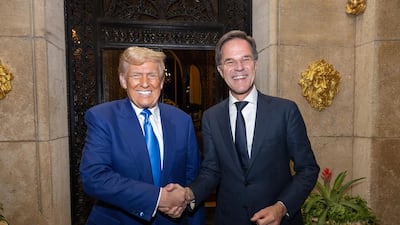Nato Secretary General Mark Rutte met US president-elect Donald Trump in Florida to discuss "global security issues facing the alliance", a spokeswoman said on Saturday.
The meeting took place on Friday in Palm Beach, Nato's Farah Dakhlallah said. The former Dutch prime minister had said he wanted to meet Mr Trump two days after he was elected on November 5 to discuss the threat of increasingly warm ties between North Korea and Russia.
In his first term as US president, Mr Trump aggressively pushed for Europe to step up defence spending and questioned the fairness of the transatlantic alliance. His re-election has raised fears in Europe that he could pull the plug on vital Washington military aid for Ukraine. Nato allies say keeping Kyiv in the fight against Moscow is crucial to both European and US security.
"What we see more and more is that North Korea, Iran, China and of course Russia are working together, working together against Ukraine," Mr Rutte said recently at a European leaders' meeting in Budapest.
"At the same time, Russia has to pay for this, and one of the things they are doing is delivering technology to North Korea", which he warned was threatening to the "mainland of the US [and] continental Europe".
"I look forward to sitting down with Donald Trump to discuss how we can face these threats collectively," said Mr Rutte, who was widely regarded as one of the best European leaders at forging a good working relationship with Mr Trump during his first term, from 2017 to 2021.
Meanwhile, Nato and Ukraine will hold emergency talks on Tuesday after Russia attacked a central city with an experimental, hypersonic ballistic missile that escalated the nearly 33-month-old war.

Ukraine’s Parliament cancelled a session as security was tightened following the strike on a military station in Dnipro on Thursday. The missile reached a speed of Mach 11 and carried six non-nuclear warheads, each releasing six submunitions, according to Ukrainian military officials.
Russia's President Vladimir Putin said in a nationally televised speech that the attack with the intermediate-range Oreshnik missile was in retaliation for Kyiv’s use of US and British longer-range missiles capable of striking deeper into Russian territory.
Western air defence systems would be powerless to stop the new missile, he said. “No one in the world has such weapons,” he said. “Sooner or later other leading countries will also get them. We are aware that they are under development."
Testing the missile will continue, “including in combat, depending on the situation and the character of security threats created for Russia”, Mr Putin said, noting there was “a stockpile” of systems ready for use.
Mr Putin said that while it is not an intercontinental missile, it is so powerful that the use of several of them fitted with conventional warheads in one attack could be as devastating as a strike with strategic – or nuclear – weapons.
Gen Sergey Karakayev, head of Russia’s Strategic Missile Forces, said the Oreshnik could reach targets across Europe and be fitted with nuclear or conventional warheads, echoing Mr Putin's claim that even with conventional warheads, “the massive use of the weapon would be comparable in effect to the use of nuclear weapons”.
On Saturday, a senior Ukrainian military source revealed that Ukraine has lost more than 40 per cent of the territory in Russia's Kursk region that it seized rapidly in a surprise incursion in August as Russian forces have mounted waves of counter-assaults.
The source, who is on Ukraine's general staff, said Russia had deployed about 59,000 troops to the Kursk region since Kyiv's forces swept in and advanced swiftly, catching Moscow unprepared, two and a half years into its full-scale invasion of Ukraine.
"At most, we controlled about 1,376 sq km, now of course this territory is smaller," the source said. "The enemy is increasing its counter-attacks. Now we control approximately 800 sq km. We will hold this territory for as long as is militarily appropriate."


